
Interview with Flemish [Belgium] SS-Oberscharführer Georges Colemonts who served in the Waffen-SS Legion 'Langemarck' and later the 2. SS-Panzer Division 'Das Reich' as a tank driver. Colemonts was also the recipient of the coveted Honor Roll Clasp award. Waterloo, Belgium, 1983.
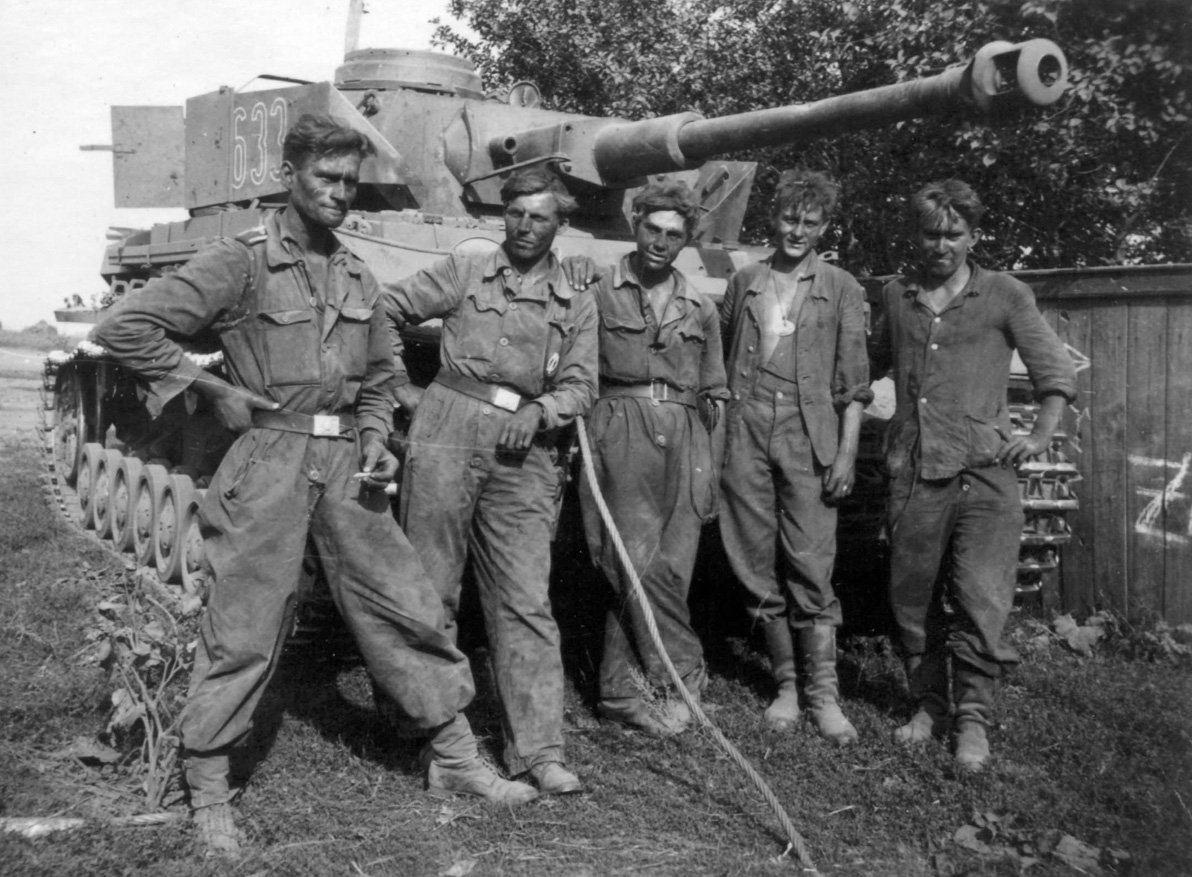
[Above: This remarkable photo was taken on August 7, 1943 during a refit with a new crew after the Battle of Kursk. The men are standing in front of a Panzerkampfwagen IV Ausf.G (Sd.Kfz.161) and are from the 2.SS-Panzergrenadier-Division 'Das Reich'.
Left to right: Tank commander, SS-Unterscharführer Gustav Schinner; gunner Rottenführer SS-Kurt Bunzeck; driver/mechanic Rottenführer SS-Georg Colemonts; loader SS-Schütze Zülcke; machinegunner/radio operator SS-Heinz Wentzel.
Extra special thanks to W. for finding this and putting a face to Georges Colemonts!]

Thanks for letting me speak with you, as it was mentioned I would only like
to ask a few questions about your time in the Waffen-SS. Can I ask why you
chose the Waffen-SS?
Georges: Ok boy, I do not know you but you know my comrades so I will
indulge you for a bit. I will many of us, myself included, do not indulge reporters
anymore. They are dishonest liars who serve their editors and not the truth. I
have seen the stories written about our time and will not oblige in helping
spread tales of fancy.
You seem okay, so I can begin by saying I joined solely due to being
patriotic. I saw a danger that existed in Europe from the reds, and it still
exists today; only NATO keeps it at bay. We tried to defeat this threat, but
the west was blind to what they were doing, they joined with this foe to defeat
the one side who understood the danger.
When Germany invaded Belgium, it was a most unwelcome act,
however there were some who understood they had to do this to defeat
France. After all, France and Britain were planning on invading us as well.
Germany gave Belgium great terms for peace, and then sent in massive help,
which was good.
I was part of Flemish patriotic groups that loved our land and
people and the Germans were good to us. While we did not need German help,
they set up our party as the leaders of our district. This was also good, they
did this all over Europe, working with patriotic groups to set up new
governments.
I did not join the SS; Himmler came to Belgium and asked for the
creation of a legion of men from Flanders to be a guard for the people. Many
of us accepted and were joined into the Legion [The Flemish Legion] upon passing exams from
doctors and admissions. We were later joined into a Regiment Langemarck
when war broke out with Russia.
I was pushed into the SS due to events out of my control. The war
in the east needed many men to fight and I volunteered to go. Since our
legion was created with the help of Himmler, he believed we also should be
members of his SS.
I agreed to this as I wanted to fight the reds and this was my ticket
to go do it. The life was good, with good pay, food, and equipment, but the
best part for me was the comrades I was with. We all shared the same feelings
and views and had a common goal. Finally, this regiment was asked to
transfer over to a new SS-Panzer Division called Das Reich; we traded one
cuff title for another.
How were you treated by the Germans since you were a foreigner?
Georges: I can tell you in Himmler's world we were not foreigners, and we
were not treated as such. We had to travel through Germany to get to our
training and the people were very kind and came out to greet us at train
stations. We wrote on the train cars various messages of who we were and where
we were from.
The girls loved it and blew kisses and threw flowers to us. It felt as
if we were again going on a crusade, as our fathers of old did, to battle the
enemy from the east. We felt back then as all of Europe supported us and was
behind us; at war's end these same people turned their backs on us.
Even in training our treatment was excellent, I saw squabbles with
Germans on who had the better football teams and better athletes, which
sometimes spilled out into the exercise yard but the SS was quick to point out
we were brothers who were on the same side fighting the same common
enemy. Remember that please, we were treated very well and as brothers.
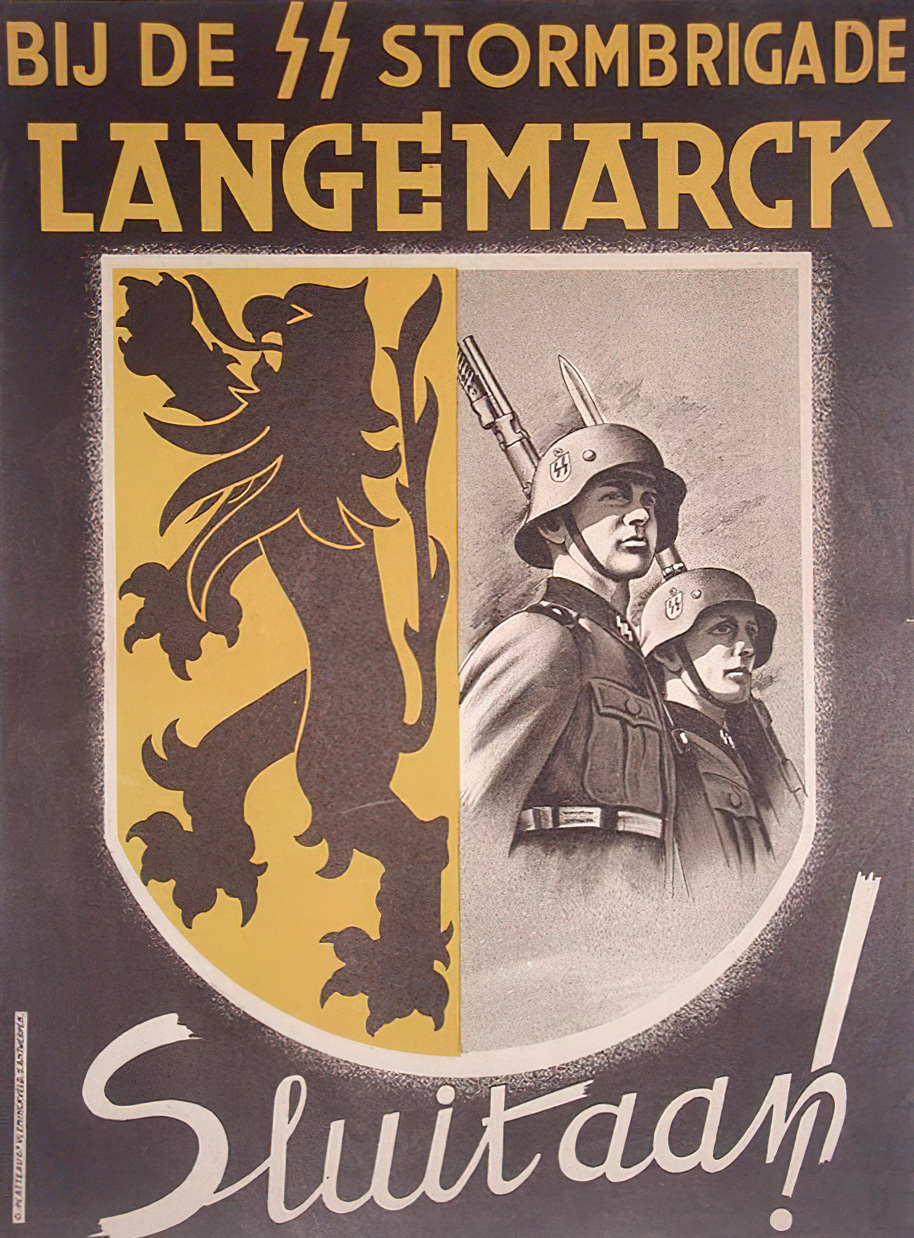
[Above: Langemarck recruiting poster.]
You were awarded the Honor Roll clasp, can I ask how you won this?
Georges: Well, all I will say ii that it was given for the final battles for Kharkov.
Stalin wanted this large city back and there were three main battles that the
SS was involved in. I was part of the third battle and was in the Panzer
regiment of Das Reich, SS-Panzer Regiment 2, of the 6th Company. I was a
driver on the Panzer IV with the long barrel, the 7.5cm cannon.
I took my lessons to heart, I never missed a gear
and got us moving quickly all the time. Speed and movement were what won
the day in a Panzer battle. We had to aim fast, fire first, and repeat. My
commander always stressed this, and we took many Ivans from the fight.
We had a good crew on our Panzer. We practically lived in our
Panzer, and it was home, unless we stopped in a village to rest, then we could
stay with a family or in a barn. I remember the smell of the gun coupled with
our sweat and stink. In the summer it was the worst, as in battle we had to
have all hatches closed which made the temperature sometimes go very high,
fans did not help.
Our loader would keep a bucket of water full for us to dip into if we
needed, but many times we spilled it. It helped to have something to chew on
like straw or tobacco to help ease thirst. Many awards were handed out for
the battles around Kharkov, it was a hard battle with heavy losses, but we
decimated Ivan.
With regards to the Russian people, I have read relations were very bad and
many crimes committed. Can I ask if that is true?
Georges: If it is true, I did not see any of it. We were not fighting the Russian
people; it was the reds that had power over the people we wanted to defeat.
As I said we stayed in many Russian villages and towns, I can attest that life
returned to pre-red revolution times for the people. They came out to
welcome us, as we had freed them from a tyranny that lasted 20 years.
I saw the churches open again and free markets were allowed, where
they could sell items without having to give profits to the state. I know that
welfare people came from all over Europe to work towards helping the people
as best they could. Belgium even had a hand in this; I saw a train with
donations for the Orthodox Church in the Kharkov region.
Food was getting scarce, and people were brought in to rebuild the
factories that Stalin destroyed in scorched earth. Food was a priority, we
were even asked to help a farmer with his harvest during a lull in the fighting.
There were also hospitals that were rebuilt and new ones built to
give the people better care and to aid the front. We had a nice repair depot
that was rebuilt from a destroyed factory. All I saw in Russia were areas that
were being renewed and reborn behind the frontlines. I saw nothing that
would give me any impression that the people were oppressed and harmed.
The papers and others have claimed many were hung or shot, which
is false. The only times this happened was if it was bandits who attacked
German forces illegally. I saw photos of this, but luckily, we were spared any
major engagements until later in the war when they were absorbed into the
Red Army, then they were treated as a regular POW.
What about the claims regarding crimes?
Georges: We are not going to talk about those, I told you they are not factual
and based on hateful lies. I saw nothing that would make me ashamed to wear
the uniform. My comrades all feel the same way, every claim has turned out
to be a lie or overstated. Even Oradour is something that got out of control,
due to the resistance, not the Das Reich men who were there to search for
captured [German] soldiers.
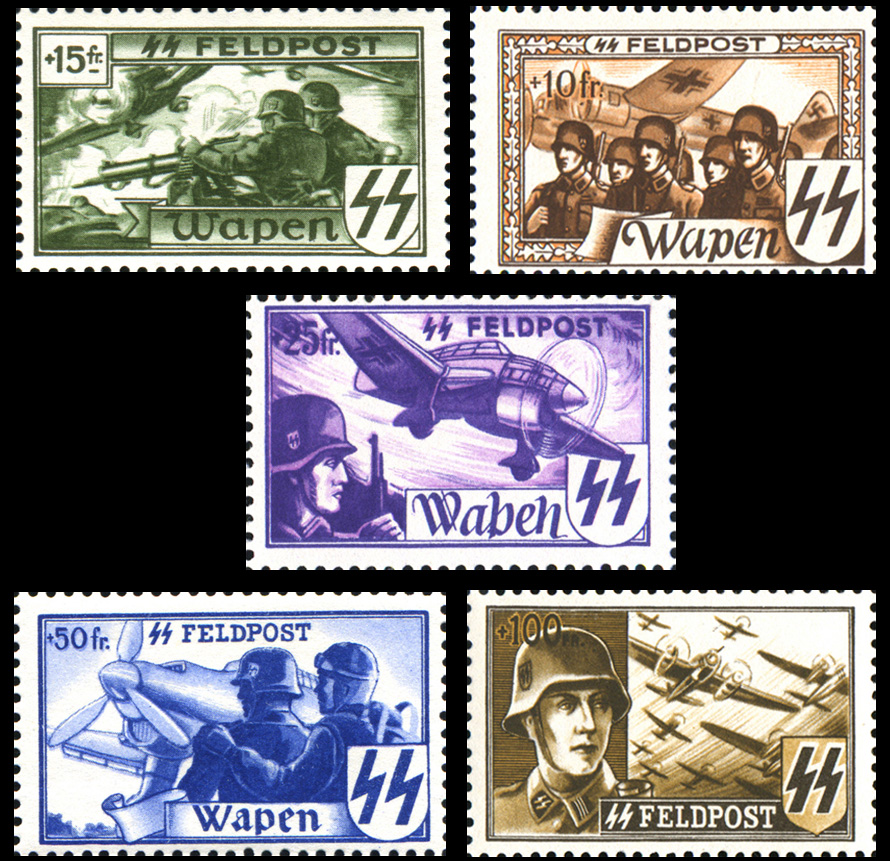
[Above: A very rare set of Flemish Waffen-SS donation stamps from 1943, although these were never issued.]
Did you see any Russian prisoners?
Georges: Yes of course. I took prisoners myself and searched them. I bet you
did not know we had a few Russians in Das Reich, they settled in my area
after the revolution. When war was announced with red Russia, they flocked
to join both the army and SS to help us fight. One even met a person from his
village and he was kept as a Hiwi for us.
These [Hiwis] were Russian prisoners who were fed up with Stalin and
asked to help us in a non-combat way. They could help cook, work on
uniforms or equipment, and be drivers for wounded. We called one Dee, as
we could not pronounce his name. We had nearly a hundred of these men in
our regiment. I have read they were all shot by the reds at war's end, if they were caught.
I remember seeing all the vast columns of prisoners that were taken,
there had to be thousands upon thousands. Many of these same men then
joined the free army of Russia and turned to fight the reds. We had to save
them a few times from being overrun later in the war.
Do you have any regrets in being a part of the German Waffen-SS?
Georges: None at all boy, as I said we have nothing to be ashamed about and
I am very proud of being a part of a group of men who were united as never
before. We fought as one against an enemy that said they wanted to bring
peace and fairness to the world.
In truth they brought hate, retribution, and fear to those who really
did not want this idea. I saw what they did to the people in Russia, and woe
to anyone who helped us. We once came into a village we retook a month
after it fell, it was empty. We later found out they either killed or deported to
the east those who stayed behind. A girl told us there was a trench not far
away where the adults were taken and shot for giving aid
to the Germans.
So, the only regret I have boy is that we did not win that damned
war. It was a war for the very last breath of a healthy European survival, free
from the red poison. The world joined to defeat our cause, and now
generations must face the price.
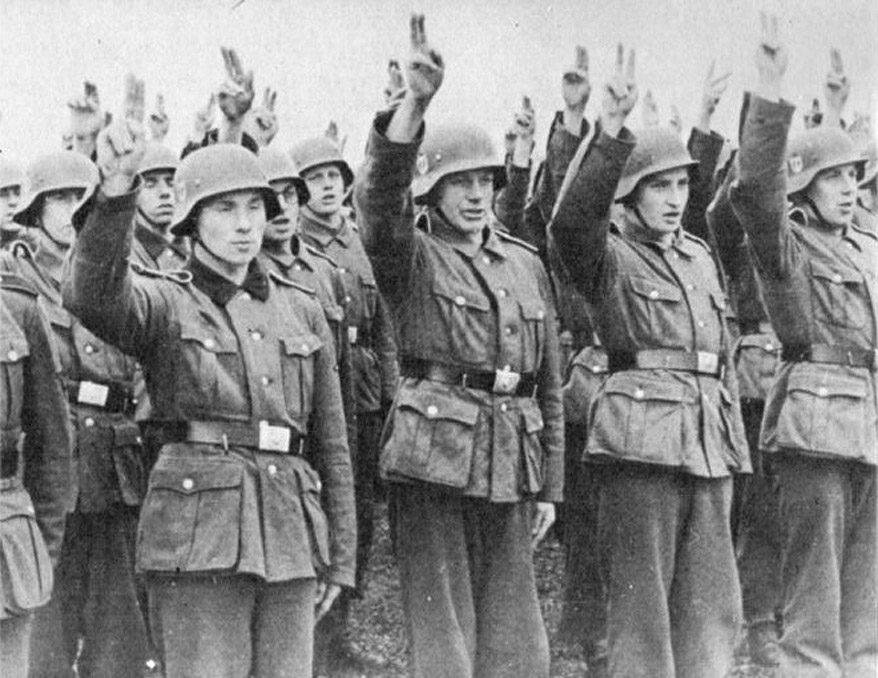
[Above: A swearing in ceremony of Flemish Waffen-SS volunteers.]
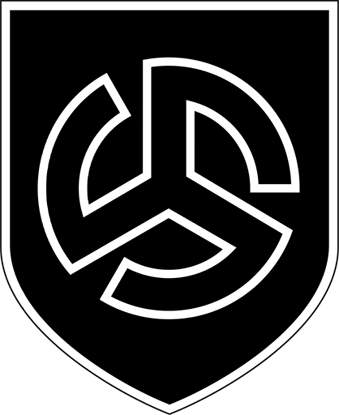
Back to Interviews








